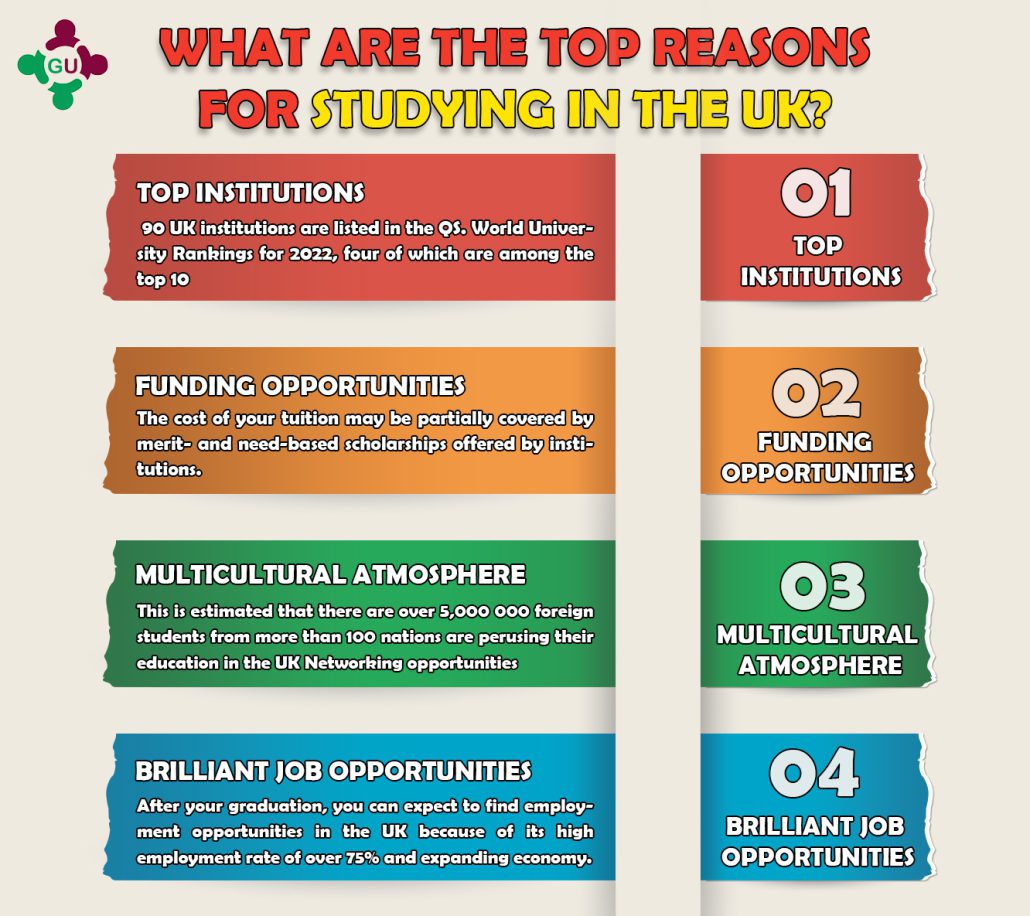Study in the UK for International Students
Estimated reading time: 14 minutes
The UK’s multicultural nature is one of the major factors that attract a large number of international students to pursue higher education in the country. It has a rich history of hospitality and friendliness that welcomes various traditions and cultures. Recently, there has been an increase in the number of international students studying in the UK. The country boasts some of the most prestigious and highly regarded universities in the world, which offer excellent academic standards, highly qualified academic staff, and research outputs that are well-recognized worldwide. Pursuing an education in the UK can undoubtedly shape your career for the better.
The United Kingdom is a highly sought-after study destination due to the diverse range of educational, social, and career prospects it provides. If you are wondering why the UK is the most popular study destination for international students, especially those from India, it is because studying in the UK can broaden your perspective, offer international recognition, impart invaluable skills, provide excellent job opportunities, and expose you to a rich culture. The UK is an exceptional place to study because of its excellent educational infrastructure, distinguished teaching methodology, quality science, rich heritage, and vibrant culture..

Overview of education in the UK. Let’s take a look at the key items that international students need to know before applying to UK universities.
| Type of programs taught | Undergraduate (Bachelors) and Graduate (Master’s and Ph.D.) |
| Language test required | English |
| Accepted languages tests | IELTS, TOEFL, GMAT, GRE, PTE, UCLES |
| Semester intakes period | Twice a year, 1-Winter semester, which starts from January or February 2- Fall semester, which starts from September or October |
| Top Courses | Management Studies, Preclinical medicines, Law, Computer Science, Design, and Architecture |
| Best affordable cities for students | Newcastle upon Tyne, Liverpool, Nottingham, Cardiff, Sheffield, Norwich and Glasgow |
| Financial assistance | Scholarships, Grants, Part-time jobs, Bursaries, awards, fellowships |
| Cost of living range | £1,400- £1,800 per month |
| Tuition and fees | £25,000-£35,000 per year |
| Type of visa | Tier 4 (General) student visa and short-term study visa |
What are the top reasons for studying in the UK?

The UK is considered the second most preferred country for international students to pursue higher education. Apart from the top-notch quality of education, there are other benefits of studying in the UK. Every year, it attracts over 600,000 foreign students for various courses such as English language programs and PhDs. The UK education system offers the flexibility to students to choose courses from different areas of study, allowing them to customize their degree as per their interests and requirements. The major reasons for international students opting to study in the UK are listed below:
1-Top institutions: 90 UK institutions are listed in the QS. World University Rankings, four of which are among the top 10: the University of Oxford, University of Cambridge, Imperial College London, and University College London.
2-Funding opportunities: The cost of your tuition may be partially covered by merit- and need-based scholarships offered by institutions. Additionally, part-time employment is permitted in the UK, and students are allowed to work up to 20 hours a week, which can help them have a better quality of life.
3-Multicultural atmosphere: This is estimated that there are over 5,000 000 foreign students from more than 100 nations pursuing their education in the UK Networking opportunities and a development mindset when you face different traditions and cultures are key to student life in the UK, which may be advantageous for your career in the future.
4-Brilliant job opportunities: After your graduation, you can expect to find employment opportunities in the UK because of its high employment rate of over 75% and expanding economy. A bachelor’s degree in the UK gives you the necessary exposure through practical training and skills, preparing you to handle real-world situations.
5-Staying after graduation: International students may apply for a new Graduate visa, which will allow them to live and work there for up to two years after graduating. Regardless of your field of study, this new rule applies to both bachelor’s and master’s degrees.
6-Part-time opportunities during education: During the academic year, UK students are permitted to work part-time jobs for up to 20 hours per week. This not only reduces their financial burden but also helps in their ability to gain worthwhile professional experience.

Education in the UK. What are the UK education system levels?
Students in the UK will study further education after completing their 12th-grade coursework. Universities in the UK supply the higher education system. The three categories of degrees offered by the British higher education system are as follows:
1-Undergraduate Degree: A Bachelor’s degree is also referred to as an undergraduate degree. It is a three- to four-year full-time program. Instead of studying only one major topic, students have the option of pursuing a dual honors degree.
2-Master’s Degree: Course-based (taught) and research-based Master’s degrees are the two primary categories. Research-based Master’s degrees require the student to conduct their research project(s) in a specific field of study, as opposed to course-based Master’s degrees, which are based on planned course modules delivered through lectures, seminars, laboratory work, or remote learning. Master’s degrees in research often take a little longer to finish than Master’s degrees in teaching.
3-Doctorate Degree: Programs leading to a Ph.D. can be pursued either full- or part-time. Depending on the subjects, the study lasts from 3 to 6 years.
Universities in the UK are in charge of delivering higher education and have the authority to award degrees. Here is a brief overview of the many university types in the UK:
Credit criteria in the UK.
The UK uses a credit system to keep track of, document, and promote simple transitions between courses and institutions. Generally speaking, 10 hours of labor equals one UK credit. To be able to get a degree, students must accrue credits for each program.
| Type of Degree | Credits needed |
| Undergraduate graduate (Bachelor’s degree) | Basic Bachelor’s Degree: 300 credits Bachelor’s Degree with Honors: 360 credits |
| Integrated Master’s degree | 480 credits |
| Postgraduate taught Master’s degree | 180 credits |
| Doctorate degree | 540 credits |

Top universities for studying in the UK
The top-ranked universities in the UK are the primary factor in international student’s decision to study there. Several prestigious universities in the UK succeed in providing quality education and assist in influencing students’ futures. Let’s examine the rankings and average tuition & fees at the top colleges in the UK:
| Institution | Avg. tuitions and fees | Avg. tuition and fees |
| University of Oxford | 2 | £18,000- £40,000 |
| University of Cambridge | 3 | £16,000- £50,000 |
| Imperial College London | 7 | £16,000- £36,000 |
| University College London | 8 | £25,000- £34,000 |
| University of Edinburgh | 16 | £16,000- £26,000 |
| University of Manchester | 27 | £19,000- £26,000 |
| King’s College London | 35 | £17,000- £28,000 |
| University of Warwick | 61 | £18,000- £29,000 |
| University of Bristol | 62 | £20,000- £24,000 |
Top courses for studying in the UK
According to official statistics, many influential people from a variety of professional fields have degrees from UK universities, and almost 500,000 foreign students are now enrolled in degree programs. There are a variety of degrees available at UK universities, some of which are more well-known internationally than others listed below:-Business
- Natural Sciences
- Engineering and Technology
- Medicine
- Law
- Social Sciences
- Sports Science
- Media and Communication
- Arts
- Hospitality and Tourism
Some of the UK’s popular international student programs are summarized in the table below. As is shown, an MBA is one of the most expensive programs in the UK and the US, Canada, Australia, etc.
| Course | Length of study | Tuition & fees |
| Master of Business Administration (MBA) | 1 Year | £56,000-£60,000 per year |
| BEng in Civil Engineering | 4 years | £24,000-£28,000 per year |
| Bachelor’s in Medicine | 5 years | £40,000-£45,000 per year |
| Master of Science (MSc) in Computer Science | 1-2 years | £25,000-£30,000 per year |
| Master of science (MSc) in Computer Science | 1-2 years | £30,000-£35,000 per year |
| Bachelor’s in Law (LLB) | 3 years | £15,000-£20,000 per year |
Admission criteria for international students in the UK
Admission process in the UK
To have a successful admission process, you are encouraged to follow the below checklists:
- Choose the UK institution and program you want to attend.
- Visit the university’s official website and submit an application there based on the course you’ve selected.
- Once you get your acceptance letters from universities, enroll in the university that best matches your interests.
- Provide your documents for the available funding opportunities such as student loans, grants, scholarships, etc.
- Submit your student visa application.
- Once your visa application is accepted, make accommodation reservations, take the first semester courses, airline tickets, etc.
Admission requirements in the UK
| Bachelor’s degree | Master’s degree | Ph.D. degree |
| -SAT/ AP Exam scores -IELTS overall score of 5.5 -Passed 13 years of pre-university education | -Bachelor’s degree certificate -IELTS overall score of 6.5 -GRE/GMAT for some courses -Good CGPA for Bachelor’s degree (minimum of 60%) | -Bachelor’s and Master’s degree certificates -Research experiences (papers, projects, good citation etc.) -IELTS overall score of 6.5 |
Cost of living breakdown in the UK for international students
Your lifestyle will affect how much it costs to live in the UK. Your cost of living will be influenced by several factors, including accommodation, transportation, and food. The following table summarizes the UK’s most common yearly expenses for international students.
| Cost category | Overall expenses per month |
| The accommodation (halls of residence, usually including bills) | £400 – £650 |
| Private accommodation (excluding bills) | £300 – £500 |
| Utility bills (electricity, gas, water) | £30 – £60 |
| Food and Housekeeping | £150 – £220 |
| Mobile phone | £20 – £60 |
| Travel or Transportation (as per the student bus pass) | £30 – £40 |
| Books and education supplies | £200 – £350 per year |
| Miscellaneous | £150-£300 |
Student-friendly and affordable cities in the UK
Making the ideal city choice for your academic years is an important choice. A good university is useless if its surroundings don’t match its great atmosphere. There are several factors to take into account while selecting a university, such as the education level, job opportunities, tuition and fees, diversity, lifestyles, and so on.

The top cities for studying in the UK
The top five cities in the UK for studying are mentioned below. These cities have been selected based on the high ranking of the universities, student diversity, and affordability from the perspective of the students.
| City | Living cost per year |
| London | £1200-£1500 |
| Edinburgh | £700-£1000 |
| Manchester | £800- £1000 |
| Glasgow | £1000- £1200 |
| Coventry | £700- £1000 |
The cheapest cities for studying in the UK
There are several reasons why students decide that they need to select a university in one of the cheapest cities in the UK. The root causes can range from lack of sufficient budget to saving money. These cheapest cities are mentioned below:
| City | Living cost per year |
| London | £1200-£1500 |
| Edinburgh | £700-£1000 |
| Manchester | £800- £1000 |
| Glasgow | £1000- £1200 |
| Coventry | £700- £1000 |
Top scholarships for studying in the UK
Several types of scholarships are available for foreign students studying in the UK, some of which are from private or governmental organizations. Colleges and universities in the UK also provide some other scholarships and grants for their students. Here are the well-known scholarships:
| Scholarship name | Who is eligible | Amount/benefits |
| Chevening Scholarships | International Students pursuing Master’s in any UK universities | Waives tuition fees, travel, and other allowances |
| Commonwealth Scholarships | Students enrolled in a full-time master’s degree | Students enrolled in full-time research programs |
| Euraxees UK | Students enrolled in the full-time research programs | 100% Funded and covers air tickets, books, medical insurance, and accommodation. |
| Felix Scholarships | Indian students enrolled in the graduate programs (Master’s or Ph.D.) except Medicine. | Waives course fees, a living cost of about £15,840, and one round-trip flight from India to the UK. |
| Clarendon Fund Scholarships | Students enrolled in the graduate programs (Master’s or Ph.D.) at Oxford University. | Covers course fees and grants for living expenses |
| University of Westminster International Scholarships | Students enrolled in the Master’s degree in any program except MBA | Fully funded coverage on tuition fees, flight charges, accommodation, and living expenses. |
| Denys Holland Scholarship at UCL | Students enrolled in the undergraduate degrees | £3,000 per year |
Job opportunities in the UK
After completing their degrees, international students in the UK will be exposed to various work opportunities. You can apply for a Graduate visa, which allows students to stay for at least two years after finishing a course of study. You will have time during these two years to find the ideal job. Let’s take a look at the potential opportunities and annual income international students can make:
| Industry area | Approximate average yearly salary |
| Engineering | £48,000 |
| Law | £60,000 |
| Marketing and Sales | £45,000 |
| Finance | £52,000 |
| Healthcare | £49,000 |

Working visa and getting permanent residency in the UK
As indicated in the previous section, graduates from UK universities can apply for a work visa right after graduation. This temporary visa would take two years to expire. The stay is up to three years for Ph.D. holders.
Apply for a skilled worker visa if you want to prolong your stay. With this visa, you are permitted to work for a recognized employer and remain in the UK.
This type of visa holder is qualified to apply for permanent residency with this visa. Be sure to select the following items to be eligible for PR in the UK:
- Worked and lived in the UK for five years.
- Obtain the required salary
- Show that your abilities are relevant to the role. A cost of £2,389 must be paid when applying for PR. The process might take six months. If you want a quick response, you must spend an extra £500–£800. Having PR in the UK opens more doors for you, such as perks and benefits, citizenship, etc. In summary, your access to top-notch education and a good life can be significantly improved by deciding to pursue further education in the UK. Due to this, international students have consistently chosen the UK as their top study-abroad location. If you’re considering migrating to the UK for further education, you’ve made a perfect choice.
Frequently Asked Questions: Study in the UK
At the latest, you must submit your application by June or July (see the specific dates for each institution). The end of September or the beginning of October is when courses begin. Apply four months beforehand to be on the safe side.
Unlike students from the UK and other European countries, those who require a Tier 4 visa can only enroll in full-time courses.
Ordinary degrees signify that a student has finished all of the required courses. Honor Degree also describes that the students have obtained all the good score levels.
Your visa application might be denied if you provide inadequate or false financial documentation. The visa officer should assure you that you will return to your country after your graduation.
No, the UK government does not offer loans to students from outside the EU. You may be qualified for university scholarships.
Depending on the program, the annual tuition for Master’s students might range from £10,500 to $33,500.
It might take one year to two years.
According to US News & World Report, Imperial College London, the University of Cambridge, the University of Manchester, the University of Nottingham, and the University of Oxford are among them.
In the UK, both course-based Master’s (MEng) and Research Master’s (MSc) programs are available.
These programs include law, social sciences, engineering and technology, creative arts and design (graphic, film, and media), and business and administrative studies.
The majority of Master’s degrees require students to complete a dissertation project, lectures, and seminars. Although the specific distinction between a taught and a research master’s varies, research master’s programs require significantly more independent work. Longer (or more complex) dissertation assignments are typically required for an MSc (Master of Research). A Ph.D. may include an MPhil (Master of Philosophy), which is research-based. Outside of the UK, Research Masters are less common.








Leave a Reply
Want to join the discussion?Feel free to contribute!